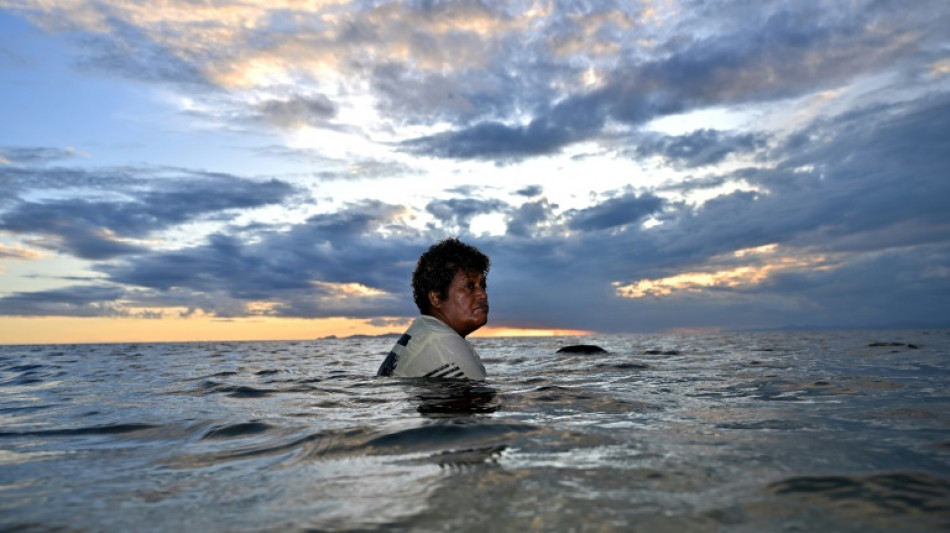
-
 Record number of migrants lost at sea bound for Spain in 2024: NGO
Record number of migrants lost at sea bound for Spain in 2024: NGO
-
Kohli called out over shoulder bump with Konstas during fourth Test

-
 Rural communities urged to flee east Australia bushfire
Rural communities urged to flee east Australia bushfire
-
Sri Lanka train memorial honours tsunami tragedy

-
 Australia's top order fires to take charge of 4th Test against India
Australia's top order fires to take charge of 4th Test against India
-
S. Korea's opposition moves to impeach acting president

-
 'We couldn't find their bodies': Indonesian tsunami survivors mourn the dead
'We couldn't find their bodies': Indonesian tsunami survivors mourn the dead
-
Azerbaijan mourns 38 killed in plane crash in Kazakhstan

-
 Konstas and Khawaja put Australia on top in 4th Test against India
Konstas and Khawaja put Australia on top in 4th Test against India
-
Lakers pip Warriors after another LeBron-Curry classic

-
 India readies for 400 million pilgrims at mammoth festival
India readies for 400 million pilgrims at mammoth festival
-
Nepal hosts hot air balloon festival

-
 Asia stocks up as 'Santa Rally' persists
Asia stocks up as 'Santa Rally' persists
-
Tears, prayers as Asia mourns tsunami dead 20 years on

-
 Sydney-Hobart yacht crews set off on gale-threatened race
Sydney-Hobart yacht crews set off on gale-threatened race
-
Key public service makes quiet return in Gaza

-
 Fearless Konstas slams 60 as Australia take upper hand against India
Fearless Konstas slams 60 as Australia take upper hand against India
-
Bridges outduels Wembanyama, Celtics lose again

-
 Hungry Sabalenka ready for more Slam success
Hungry Sabalenka ready for more Slam success
-
DeepWay Completed 750 Million RMB Series B Financing to Accelerate the R&D of Intelligent New Energy Heavy Trucks

-
 Mass jailbreak in Mozambique amid post-election unrest
Mass jailbreak in Mozambique amid post-election unrest
-
Azerbaijani jet crashes in Kazakhstan, killing 38

-
 Bridges outduels Wembanyama as Knicks beat Spurs
Bridges outduels Wembanyama as Knicks beat Spurs
-
2004 Indian Ocean tsunami: what to know 20 years on

-
 Asia to mourn tsunami dead with ceremonies 20 years on
Asia to mourn tsunami dead with ceremonies 20 years on
-
Syrians protest after video of attack on Alawite shrine

-
 Russian state owner says cargo ship blast was 'terrorist attack'
Russian state owner says cargo ship blast was 'terrorist attack'
-
38 dead as Azerbaijani jet crashes in Kazakhstan

-
 Crisis-hit Valencia hire West Brom's Corberan as new boss
Crisis-hit Valencia hire West Brom's Corberan as new boss
-
Suriname ex-dictator and fugitive Desi Bouterse dead at 79

-
 35 feared dead as Azerbaijani jet crashes in Kazakhstan
35 feared dead as Azerbaijani jet crashes in Kazakhstan
-
Pope calls for 'arms to be silenced' in Christmas appeal

-
 Syria authorities say torched 1 million captagon pills
Syria authorities say torched 1 million captagon pills
-
Pope calls for 'arms to be silenced' across world

-
 32 survivors as Azerbaijani jet crashes in Kazakhstan
32 survivors as Azerbaijani jet crashes in Kazakhstan
-
Pakistan air strikes kill 46 in Afghanistan, Kabul says

-
 Liverpool host Foxes, Arsenal prepare for life without Saka
Liverpool host Foxes, Arsenal prepare for life without Saka
-
Japan FM raises 'serious concerns' over China military buildup

-
 Pope's sombre message in Christmas under shadow of war
Pope's sombre message in Christmas under shadow of war
-
Zelensky condemns Russian 'inhumane' Christmas attack on energy grid

-
 Sweeping Vietnam internet law comes into force
Sweeping Vietnam internet law comes into force
-
Pope kicks off Christmas under shadow of war

-
 Catholics hold muted Christmas mass in Indonesia's Sharia stronghold
Catholics hold muted Christmas mass in Indonesia's Sharia stronghold
-
Japan's top diplomat in China to address 'challenges'

-
 Thousands attend Christmas charity dinner in Buenos Aires
Thousands attend Christmas charity dinner in Buenos Aires
-
Demand for Japanese content booms post 'Shogun'

-
 As India's Bollywood shifts, stars and snappers click
As India's Bollywood shifts, stars and snappers click
-
Mystery drones won't interfere with Santa's work: US tracker

-
 Djokovic eyes more Slam glory as Swiatek returns under doping cloud
Djokovic eyes more Slam glory as Swiatek returns under doping cloud
-
Australia's in-form Head confirmed fit for Boxing Day Test


Graves sink, fisheries shrink as climate change hits Fiji
The sea has already swallowed the village graveyard in Togoru, Fiji, and long-time resident Lavenia McGoon is dreading the day it claims her house.
She piles old rubber car tyres under the coconut trees that line the beachfront, hoping this makeshift seawall will at least buy some time.
The 70-year-old believes climate change, and the creeping ocean, will inevitably force her family to leave.
"Nobody can stop it," she tells AFP, as the tide sweeps in and crabs scuttle over the headstones.
"Nobody can stop water."
Togoru is a small settlement on the south coast of Fiji's largest island, Viti Levu.
It is one of dozens of coastal villages in the Pacific archipelago now confronting the reality of climate change.
McGoon, called "Big Nana" by locals, has spent almost 60 years here -- living on the shoreline in a basic wooden house without power or running water.
"We used to have a plantation right in front," McGoon says, pointing towards the sea.
"After 20 to 30 years we have lost almost 55 metres (60 yards) of land."
About 200 people were once buried in the Togoru graveyard, but McGoon says most of the remains have since been moved inland.
For now she refuses to follow, clinging on to her small piece of paradise.
"Relocation to me at this age, it's a bit too... sickening," she says.
- 'A big difference' -
Fiji has been meticulously preparing for the day it needs to relocate coastal villages because of climate change.
The scale of the challenge is enormous -- the government estimates more than 600 communities could be forced to move, including 42 villages under urgent threat.
More than 70 percent of the country's 900,000 people live within five kilometres (three miles) of the coast.
According to Australia's Monash University, sea levels have been rising in the western Pacific Ocean two to three times faster than the global average.
Entire low-lying nations such as Kiribati and Tuvalu could become uninhabitable within the next 30 years.
Fiji is fortunate that its highland regions make relocation a feasible option.
The settlement of Vunidogoloa, on the northern island of Vanua Levu, moved to higher ground in 2014 -- making it one of the first villages in the world to relocate because of rising sea levels.
Other villages, such as Veivatuloa, are exhausting their options for adaptation before abandoning their homes.
Veivatuloa lies about 40 kilometres west of the capital Suva and has a population of around 200 people.
The village's stilted houses sit in rows facing the water, while decaying wooden planks bridge the pools of seawater collecting on the ground at low tide.
The corrosive sea salt has eaten small holes into the walls of some buildings.
Veivatuloa has been lobbying the Fijian government to strengthen its old seawall, which is now regularly breached by waves.
Provincial spokesman Sairusi Qaranivalu says relocation is a painful idea for a village such as Veivatuloa, where customs are linked to the land.
"Once we take them away from the villages, it's like we are disconnecting them from the traditional duties they have to perform to their chiefs," he tells AFP.
"It's like deconstructing the traditional living and the way we live together."
The ocean is inching closer to the village, but elder Leone Nairuwai says he has to travel further out to sea to catch fish.
"When you used to go out to the sea you just go, I think, 20 yards (and) you catch the fish," he says.
"But now you take the outboard, it's a mile, and then you'll get a fish. There's a big difference."
- Shrinking catch -
About half of Fiji's rural population relies on fishing for survival, according to the United Nations Food and Agriculture Organisation.
But the country's fisheries are under pressure on multiple fronts.
Warmer seas are disrupting coastal ecosystems, while stocks of valuable species such as tuna have been plundered by foreign vessels.
Local guide and subsistence fisherman Abaitia Rosivulavula ekes out a living selling his catch to the restaurants around Pacific Harbour, a tourist hotspot dotted with luxury resorts.
He uses the sawn-off bottom of a plastic milk bottle to scoop water from his fibreglass boat before gunning the outboard motor towards a nearby reef.
Most of his bait is taken by sharks, and the handful of fish he manages to reel in before sunset are too small to get his hopes up.
"Before, it's plenty (of) fish," he tells AFP before casting his line again.
"Before, the size of the fish is big, now it's just like this," he adds, making a shrinking gesture with his hands.
Fiji is ranked 12 on the Nature Conservancy's Fisheries at Risk Index, which looks at "climate-related risk to coastal fisheries" in 143 countries.
Four other Pacific nations -- Micronesia, Solomon Islands, Vanuatu and Tonga -- sit inside the top 10.
Back in the settlement of Togoru, "Big Nana" McGoon says small countries like Fiji are being left to foot the bill while others refuse to reduce their emissions.
"They only think of money coming in," she says. "They never think of other people, the ones who will be suffering."
While McGoon wants to stay next to the sea for as long as she can, she's resigned to watching her grandchildren leave.
"I love this place. It's beautiful," she says.
"The only thing I'm telling my grandchildren... go to school and achieve your goals. Aim for overseas.
"Because the water will always take its course."
Ch.Havering--AMWN



